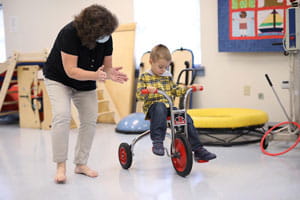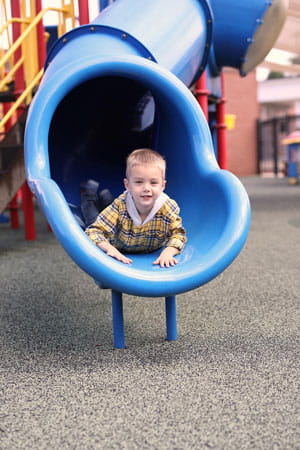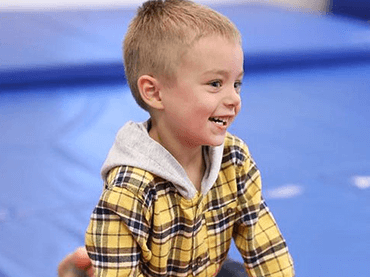In-Person Pediatric Rehab During Pandemic Helps Graham Thrive
When the pandemic shut down schools in March 2020, it also halted many support services that families rely on for help with their child’s development. This was especially true for the family of Graham Hertwig, a 4-year-old from South Williamsport.
Early Intervention
At the age of 2, Graham’s parents, Josh and Elisha, noticed developmental delays. He wasn’t hitting the normal milestones they saw in his older sister, Scarlett. As many parents of children with developmental delays know, the process of assessment and diagnosis can take time. While you are dealing with communication or behavior issues, you are also working to get a diagnosis and find the support services your child needs.
Last year, Graham was diagnosed with global development disorder and autism spectrum disorder.
“Having a diagnosis can unlock a lot of resources,” says Josh. “Early intervention and social interaction are key for kids with developmental disorders.”
The Hertwigs hired a speech therapist for Graham to supplement the services through early intervention and BLaST Intermediate Unit 17. BLaST is an educational service agency for Bradford, Lycoming, Sullivan, and Tioga counties. In September, Graham started school. He attended BLaST three days a week and the Lycoming County Children’s Development Center two days a week.
Graham was receiving speech and occupational therapy through BLaST and began physical therapy in December with a UPMC pediatric therapist through the contract between UPMC and BLaST.

Services During the Pandemic
“Because BLaST models the public school year, we decided to keep our speech therapist for support in addition to the other services,” says Josh. “Then everything changed when COVID-19 shut down schools and, well—everything else.”
Josh and Elisha set up a home schedule for schooltime with both Graham and Scarlett. Elisha was working from home, and Josh’s business temporarily closed because of the pandemic. As schools scrambled to decide how to safely provide care to children, services stopped. When physical, occupational, and speech therapy services did start again, they were provided virtually through live video.
“Any parent with a special needs child—especially a young child—knows that video learning is not the same as in-person learning,” says Josh. “We understood that the focus was on our child’s safety, but we didn’t want him to regress.”
During a virtual physical therapy appointment, Jess, Graham’s physical therapist, mentioned that UPMC also offered in-person pediatric physical, occupational, and speech therapy services at 625 West Edwin Street in Williamsport.
“I would not have known these services were available locally had Jess not told us,” says Josh. “It was a blessing to us and to Graham.”
Graham received therapy two days a week at UPMC’s clinic. His care team coordinated his appointments so that he would spend 30 minutes with each therapist back-to-back, making the most of his time with providers in the facility. Even though Graham received services in a clinical setting during the pandemic, the Hertwig family never worried about the risks of COVID-19 exposure at the facility.
In addition to the convenience of coordinated back-to-back appointments, this approach also reduced the number of times Graham and his family needed to come and go from the facility, reducing their chances of exposure.
“They took every precaution necessary to keep Graham safe,” says Josh. “I don’t know where we would be right now if he wasn’t able to get support through UPMC. He was able to continue in-person services and receive the social interaction he needs."

Grateful Family
The Hertwigs have noticed a lot of growth in Graham over the past several months that may not have been possible without in-person therapy.
“Graham loves his therapists, and he is excited to go every time. He works with multiple therapists and loves them all—Jess, Theda, Bill, Lexi, and Joan,” says Josh. “He responds well to every one of them. “No two kids with developmental disorders are the same,” Josh adds.
“Every child will have different treatments that work for them. We still don’t know Graham’s full potential, but we do know that getting support while he is young is key to how he develops both physically and emotionally.”
For Graham, that includes in-person instruction for the entire school year, but he will continue his outpatient therapies with UPMC to supplement his school services.

















